|
Books Should Be Free Loyal Books Free Public Domain Audiobooks & eBook Downloads |
|
|
Books Should Be Free Loyal Books Free Public Domain Audiobooks & eBook Downloads |
|
Top Authors |
|---|
|
Book type:
Sort by:
|
By: Kate M. Foley | |
|---|---|
 Five Lectures on Blindness
Five Lectures on Blindness
The [five] lectures were written primarily to be delivered at the summer sessions of the University of California, at Berkeley and at Los Angeles, in the summer of 1918. . . they are the outgrowth of almost a quarter of a century spent in work for the blind, and were written from the standpoint of a blind person, seeking to better the condition of the blind. They were addressed not to the blind, but to the seeing public, for the benefit that will accrue to the blind from a better understanding of their problems. (Extract from the Forward by Milton J. Ferguson) | |
By: Albert Ernest Jenks | |
|---|---|
 The Bontoc Igorot
The Bontoc Igorot
The Bontoc Igorotby Albert Ernest JenksPREFACEAfter an expedition of two months in September, October, and November, 1902, among the people of northern Luzon it was decided that the Igorot of Bontoc pueblo, in the Province of Lepanto-Bontoc, are as typical of the primitive mountain agriculturist of Luzon as any group visited, and that ethnologic investigations directed from Bontoc pueblo would enable the investigator to show the culture of the primitive mountaineer of Luzon as well as or better than investigations centered elsewhere... | |
By: William Cullen Bryant (1794-1878) | |
|---|---|
 Journey of Life
Journey of Life
LibriVox volunteers bring you 14 recordings of The Journey of Life by William Cullen Bryant. This was the Weekly Poetry project for December 23, 2012.William Cullen Bryant was an American romantic poet, journalist, and long-time editor of the New York Evening Post. His poetry has been described as being "of a thoughtful, meditative character, and makes but slight appeal to the mass of readers." ( | |
 Midsummer
Midsummer
LibriVox volunteers bring you 14 recordings of Midsummer by William Cullen Bryant. This was the Weekly Poetry project for June 23, 2013.This poem taken from the Poetical Works of William Cullen Bryant, Household Edition. | |
By: Gregory of Nazianzus (329-389/390) | |
|---|---|
 Theological Orations
Theological Orations
After the death of the Arian Emperor Valens, the synod of Antioch in 379 asked Gregory to help resurrect Constantinople to Nicene orthodoxy. While the most important churches were still headed by Arian bishops, Gregory transformed his cousin's villa into the Anastasia chapel. From this little chapel he delivered five powerful discourses on Nicene doctrine, explaining the nature of the Trinity and the unity of the Godhead. These are called the "Theological Orations." By the time he left Constantinople two years later, there did not remain one Arian church in all of the city. | |
By: H. C. Bailey (1878-1961) | |
|---|---|
 The Highwayman
The Highwayman
A romance and adventure novel, set in England during the reign of Queen Anne. The book is much unlike the author's later detective short stories. The actual book is difficult to locate and appears to have been forgotten. It is not even listed by Wiki as part of the author's work, nevermind have any information on the book itself. | |
By: John Berryman (1919-1988) | |
|---|---|
 Card Trick
Card Trick
The Psi Lodge had their ways and means of applying pressure, when pressure was needed. But the peculiar talent this fellow showed was one that even they'd never heard of...! | |
By: Aemilia Lanyer (1569-1645) | |
|---|---|
 Salve Deus Rex Judaeorum
Salve Deus Rex Judaeorum
Aemilia Lanyer's 1611 poem is far more than a retelling of The Passion. It comprises a spirited defense of Eve (and, by extension, all women), elegant praises for her female patrons, a catalogue of virtuous women of the ancient world, and closes with the first "country house" poem written by a woman in English. | |
By: Florence Holbrook (1860-1932) | |
|---|---|
 Dramatic Reader for Lower Grades
Dramatic Reader for Lower Grades
Despite the title's bland sounding name, this book is a charming collection of 16 plays for children. These little plays—well-known stories done into dialogue—were written for children who like to imagine themselves living with their favorite characters in forest, in palace, or in fairyland. Included are Cinderella, Robin Hood, William Tell, Hansel and Gretel and many more. | |
By: Edgar A. Guest (1881-1959) | |
|---|---|
 All That Matters
All That Matters
A collection of poems about life. Written in an easy and interesting style this book includes poems about many parts of family life, motherhood, babies, dads, and youth. None of them long, they focus the listener on the blessings of life. | |
By: Florence Holbrook (1860-1932) | |
|---|---|
 Book of Nature Myths
Book of Nature Myths
This is a book of myths told by the Indians of North America to their children. They could be compared to present day Fairy Tales. | |
By: H. S. Olcott (1832-1907) | |
|---|---|
 Buddhist Catechism
Buddhist Catechism
The simple aim of this little book is to give so succinct and yet comprehensive a digest of Buddhistic history, ethics and philosophy as to enable beginners to understand and appreciate the noble ideal taught by the Buddha, and thus make it easier for them to follow out the Dharma in its details. In this book, information is presented in a catechism format: question and answer. The matter has been grouped within five categories, viz.: (1) The Life of the Buddha; (2) the Doctrine; (3) the Sangha, or monastic order; (4) a brief history of Buddhism, its Councils and propaganda; (5) some reconciliation of Buddhism with science... | |
By: ‘Abdu’l-Bahá ‘Abbás (1844-1921) | |
|---|---|
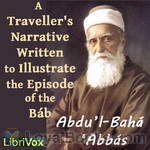 A Traveller’s Narrative Written to Illustrate the Episode of the Báb
A Traveller’s Narrative Written to Illustrate the Episode of the Báb
“This book is the history of a proscribed and persecuted sect written by one of themselves,” writes Professor Edward Granville Browne, the Cambridge Orientalist who translated this narrative. “After suffering in silence for nigh upon half a century, they at length find voice to tell their tale and offer their apology. Of this voice I am the interpreter.” This work is the story of the life of the Siyyid ‘Alí-Muhammad-i-Shírází (1819-1850), known as the “Báb”, which is Arabic for “Gate”... | |
By: Isaac Watts (1674-1748) | |
|---|---|
 Psalms of David
Psalms of David
Isaac Watts was a poet, hymn-writer and musician. He wrote many of what we regard as "classical hymns" such as "Joy to the World" and "When I survey the wondrous cross". His translations of the Psalms are therefore poetical and musical, as they were designed to be sung. He captures in elegant English the feel of the original Psalms as they would have been heard by the Israelites thousands of years ago. | |
By: Edward Eggleston (1837-1902) | |
|---|---|
 Hoosier Schoolmaster
Hoosier Schoolmaster
"Want to be a school-master, do you? You? Well, what would you do in Flat Crick deestrick, I'd like to know? Why, the boys have driv off the last two, and licked the one afore them like blazes. You might teach a summer school, when nothin' but children come. But I 'low it takes a right smart man to be school-master in Flat Crick in the winter. They'd pitch you out of doors, sonny, neck and heels, afore Christmas." | |
By: Harry A. Lewis | |
|---|---|
 Hidden Treasures
Hidden Treasures
"Some succeed while others fail. This is a recognized fact; yet history tells us that seven-tenths of our most successful men began life poor." A selection of mini-biographies teaches us how some successful men have overcome odds to make their mark on history. | |
By: Thomas H. Burgoyne (1855-1894) | |
|---|---|
 The Light of Egypt, vol II
The Light of Egypt, vol II
"The Light of Egypt" will be found to be an Occult library in itself, a textbook of esoteric knowledge, setting forth the "wisdom Religion" of life, as taught by the Adepts of Hermetic Philosophy. It will richly repay all who are seeking the higher life to carefully study this book, as it contains in a nutshell the wisdom of the ages regarding man and his destiny, here and hereafter. The London and American first edition, also the French edition, Vol. I, met with lively criticism from Blavatsky Theosophists, because it annihilates that agreeable delusion of "Karma" and "Reincarnation" from the minds of all lovers of truth for truth's sake. | |
By: Howard Overing Sturgis (1855-1920) | |
|---|---|
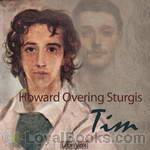 Tim
Tim
The first of only three novels by English author Howard Overing Sturgis, the son of wealthy American expatriates and a close friend of Henry James, Tim portrays a sensitive young boy’s affection for an older boy. (Introduction by Dorlene Kaplan) | |
By: Elizabeth Keckley (1818-1907) | |
|---|---|
 Behind the Scenes
Behind the Scenes
This is the autobiography of Elizabeth Keckley, a former slave who bought her freedom with the money she earned as a seamstress. She eventually worked for Mary Lincoln. It is a fascinating book, filled with many recollections of her own life and her interactions with the Lincolns and other members of the government elite. | |
By: Ellen G. White (1827-1915) | |
|---|---|
 Great Controversy
Great Controversy
This great work covers the history of the Christian dispensation, from the fall of Jerusalem, through the Dark Ages and Reformation, to the yet-future final triumph of Jesus over Satan. | |
By: George Griffith (1857-1906) | |
|---|---|
 Honeymoon in Space
Honeymoon in Space
| |
By: Robert Lynd (1879-1949) | |
|---|---|
 Old and New Masters
Old and New Masters
Jane Austen, WB Yeats, Chesterton, Shaw... these are personal and intelligent short essays on a selection of great (and great-ish) writers: some well known, and some a bit more obscure to the average reader today. Robert Lynd (1879 – 1949) is best known as a literary essayist and Irish nationalist. He published many essays, all written in an easy, conversational style. Lynd was an essayist after the manner of Charles Lamb, and deserves to be better known. A complete list of his works is available at Wikipedia: http://en.wikipedia.org/wiki/Robert_Wilson_Lynd | |
By: Friedrich de la Motte Fouqué (1777-1843) | |
|---|---|
 Sintram and His Companions
Sintram and His Companions
Friedrich de la Motte Fouque, also the author of Undine, was a German Romantic writer whose stories were filled with knights, damsels in distress, evil enchantments, and the struggle of good against overpowering evil. 'My strength is as the strength of ten, Because my heart is pure.' Fouque blends the Romantic love for nature and ancient chivalry while telling a powerful story about a young man who yearns for that which he can never attain. | |
By: Guy Boothby (1867-1905) | |
|---|---|
 Cabinet Secret
Cabinet Secret
Witty spy adventure set during the Boer Wars of the late 19th Century. | |
 Bid For Fortune; Or, Dr Nikola's Vendetta
Bid For Fortune; Or, Dr Nikola's Vendetta
Guy Newell Boothby (1867 – 1905) was a prolific Australian writer. He moved to London in 1894 and became most well-known for his Dr.Nikola mysteries. This book is the first in a series of five and introduces the good doctor himself. Dr Nikola Is a criminal mastermind with an occult twist and like much fiction of that era this book and the following are more about how others fall under his spell and into his web. Here we have an adventure and love story that sweeps us from Australia, the South Seas, the Middle East and rural Hampshire with our lovestruck hero constantly battling against Dr Nikola and his cohorts... | |
By: Vita Sackville-West (1892-1962) | |
|---|---|
 Poems of West and East
Poems of West and East
Victoria Mary Sackville-West, The Hon Lady Nicolson, best known as Vita Sackville-West, was an English author and poet. Her long narrative poem, The Land, won the Hawthornden Prize in 1927. She won it again, becoming the only writer to do so, in 1933 with her Collected Poems. She helped create her own gardens in Sissinghurst, Kent, which provide the backdrop to Sissinghurst Castle. She was famous for her exuberant aristocratic life, her strong marriage, and her passionate affair with novelist Virginia Woolf. Poems of West and East is a short collection of her early work, which was published in 1917. (Summary by Wikipedia and Elizabeth Klett) | |
By: Alicia Catherine Mant (1788-1869) | |
|---|---|
 Blue Jar Story Book
Blue Jar Story Book
This is a collection of 6 delightful stories about children by some of the best authors of the period: Charles Lamb, Mary Lamb, Maria Edgeworth and Alicia Catherine Mant. These stories are well written and although they feature children and their escapades, clearly can be enjoyed by adults as well if not more. | |
By: Joseph Crosby Lincoln (1870-1944) | |
|---|---|
 Cape Cod Stories
Cape Cod Stories
This book (eleven short stories) was also published under the title of “The Old Home House”. Joseph Crosby Lincoln (1870 – 1944) was an American author of novels, poems, and short stories, many set in a fictionalized Cape Cod. Lincoln's work frequently appeared in popular magazines such as the Saturday Evening Post and The Delineator.... Lincoln claimed that he was satisfied "spinning yarns" that made readers feel good about themselves and their neighbors. Two of his stories have been adapted to film... | |
By: Gertrude Atherton (1857-1948) | |
|---|---|
 Avalanche
Avalanche
Price Ruyler has been sent to San Francisco from New York to salvage the family business after the 1906 earthquake. His success makes him one of the city's most eligible bachelors but he resists the machinations of the local girls (and their mothers). Then he meets the beautiful and captivating Helene. He proposes within a week. Into the fourth year of their marriage, he realizes something has changed. He still loves his wife and he believes she loves him but he begins to wonder about her mysterious past and questions whether family secrets were buried in the rubble left by the earthquake. | |
 Rezanov
Rezanov
This novel by the prolific Californian author Gertrude Horn Atherton is based on the real life story of Nikolai Rezanov, a man who, in 1806, pushed for the Russian colonization of Alaska and California. "Not twenty pages have you turned before you know this Rezanov, privy councilor, grand chamberlain, plenipotentiary of the Russo-American company, imperial inspector of the extreme eastern and northwestern dominions of his imperial majesty Alexander the First, emperor of Russia—all this and more, a man... | |
 Valiant Runaways
Valiant Runaways
Savage bears, a river rescue, capture by Indians, escape on wild mustangs and a revolutionary battle await the protagonists of this suspenseful adventure novel, set in California. | |
 Daughter Of The Vine
Daughter Of The Vine
We are introduced to Englishman Dudley Thorpe on the evening of his arrival in California. At a ball, he is introduced to several belles, including the lovely Nina Randolph. Is this the start of something special? Dudley thinks so, but what about Nina? Why won't she open herself up to love? She is obviously attracted to Dudley. What is the dark secret she is hiding? Will it make a difference to Dudley's feelings? Who will be there for her in her time of need? Dudley or her odious cousin, Richard Clough? And what will San Francisco society make of it all? | |
 Sleeping Fires
Sleeping Fires
The story of a love so strong that neither the rigid rules of Society in California in the 1800s nor the very bowels of hell could keep a young woman from the love she had found. A story rich in fashion ad feminism showing how determination and love could overcome all obstacles. | |
 Senator North
Senator North
"When, Mr. President, a man, however eminent in other pursuits and whatever claims he may have to public confidence, becomes a member of this body, he has much to learn and much to endure. Little does he know of what he will have to encounter. He may be well read in public affairs, but he is unaware of the difficulties which must attend and embarrass every effort to render what he may know available and useful. He may be upright in purpose and strong in the belief of his own integrity, but he cannot... | |
By: Henry Blake Fuller (1857-1929) | |
|---|---|
 Bertram Cope's Year
Bertram Cope's Year
This novel was perhaps the most daring and affirmative LGBT literature of the first two decades of the 20th century in America. In this story, Bertram Cope is a young college instructor, about twenty-four years old ("certainly not a day over twenty-five"), who is pursued by men and women, both younger and older than himself. In writing this novel, Fuller had to carefuly craft his plot schemes so as not to offend the sensibilities of publishers. As a result, today's reader is left somewhat, but not entirely, confused about the precise feelings that characters develop for one another by the end of the book... | |
By: William Still (1821-1902) | |
|---|---|
 Underground Railroad, Part 1
Underground Railroad, Part 1
”It was my good fortune to lend a helping hand to the weary travelers flying from the land of bondage.” William Still. "Dear Sir:—For most of the years I have lived, the escape of fugitives from slavery, and their efforts to baffle the human and other bloodhounds who tracked them, formed the romance of American History. That romance is now ended, and our grandchildren will hardly believe its leading incidents except on irresistible testimony. I rejoice that you are collecting and presenting that testimony, and heartily wish you a great success... | |
By: Roy Rockwood | |
|---|---|
 Dave Dashaway and His Hydroplane
Dave Dashaway and His Hydroplane
Never was there a more clever young aviator than Dave Dashaway. All up-to-date lads will surely wish to read about him. This second volume of the series shows how Dave continued his career as a birdman and had many adventures over the Great Lakes, and how he foiled the plans of some Canadian smugglers. (From the 1913 edition) | |
By: Jack Williamson (1908-2006) | |
|---|---|
 Salvage in Space
Salvage in Space
This is an SF tale of excitement, danger, derring-do and strangely enough, love. A lonely and very poor asteroid miner, slowly collecting bits of metallic ore in the asteroid belt on his slowly accumulating 'planet' of debris, sees and captures a derelict space ship with a horrible monster aboard .. as well as a dead but lovely girl. How does it all end? Well you will need to listen to find out. One of Jack Williamson's early tales that earned him his reputation as a master story teller. | |
By: Apollonius Rhodius (3rd Cent. -3rd Cent.) | |
|---|---|
 Argonautica
Argonautica
The story of how Jason and a group of famous heroes of Greece took to sea in the Argos has been told many times, before and after Apollonius of Rhodes, wrote his Argonautica, in the 3rd century b.C.. It is not only the oldest full version of the tale to arrive to our days, but also the only extant example of Hellenistic epic. This was already a popular myth by the times of Apollonius, who makes the story of how Jason and the Argonauts sail to Colchis in search of the Golden Fleece, and have to go through a lot of adventures to fulfill their task, a mix of simple narrative and scholarly catalog. The Argonautica had a deep impact on European literature as a whole. | |
By: Samuel Hopkins Adams (1871-1958) | |
|---|---|
 The Secret of Lonesome Cove
The Secret of Lonesome Cove
A body is found on the beach not far from a New England town one morning. Curiously, nobody recognizes the dead woman, and nobody in or near the town seems to be a suspect in a possible murder, therefore most of them assume that she simply washed ashore from a passing vessel. Only problem is vessels didn't pass that stretch of the coast because of it's peculiar tides and eddies; hence its name, Lonesome Cove. Following the finding of the body, the officials of the town start acting a bit peculiar towards how to handle the dead body... | |
By: Edward P. Roe (1838-1888) | |
|---|---|
 He Fell in Love with His Wife
He Fell in Love with His Wife
James desperately needs someone to help him keep his farm going, but has failure after colossal failure finding a good housekeeper. Alida marries a man only to find out he's already married. She's so undone when she finds out that she just wants to go somewhere where no one will judge her for her misfortune, where she can work and keep herself fed and clothed. James and Alida meet and arrange for a strictly business marriage, leaving loving and honoring out of the vows. The title of the book tells the rest of the story, but the way it gets there is worth the journey. (Introduction by TriciaG) | |
By: Ukawsaw Gronniosaw (c.1705-1775) | |
|---|---|
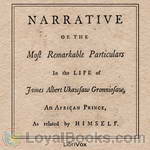 A Narrative of the Most Remarkable Particulars in the Life of James Albert Ukawsaw Gronniosaw
A Narrative of the Most Remarkable Particulars in the Life of James Albert Ukawsaw Gronniosaw
Ukawsaw Gronniosaw, also known as James Albert, (born ca. 1705 - 1775) was a freed slave and autobiographer. His autobiography is considered the first published by an African in Britain. Gronniosaw's autobiography was produced in Kidderminster in the late 1760s. Its full title is A Narrative of the Most remarkable Particulars in the Life of James Albert Ukawsaw Gronniosaw, an African Prince, As related by himself. It was the first Slave narrative in the English language. Published in Bath in 1772, it gives a vivid account of Gronniosaw's life, from his capture in Africa through slavery to a life of poverty in Colchester and Kidderminster... | |
By: Robert Louis Stevenson and Lloyd Osbourne (1850-1894) | |
|---|---|
 The Ebb-Tide
The Ebb-Tide
Three men down on their luck in Tahiti agree to ship out on a vessel whose officers have died of smallpox. Their desperate venture inspires them to a further idea: they will steal the schooner and its cargo of champagne, sell them, and live a plentiful life. The thought is intoxicating... and so is the cargo, which they sample. Inattention nearly brings them to grief in a sudden storm. This sobering experience is followed by another - apparently the dead officers had a similar ambition! - and their dreams of riches vanish... | |
By: Robert Louis Stevenson (1850-1894) | |
|---|---|
 Wrecker
Wrecker
The Wrecker (1892) is a novel written by Robert Louis Stevenson in collaboration with his stepson Lloyd Osbourne. The story is a 'sprawling, episodic adventure story, a comedy of brash manners and something of a detective mystery'. It revolves around the abandoned wreck of the Flying Scud at Midway Island. Clues in a stamp collection are used to track down the missing crew and solve the mystery. It is only in the last chapter that different story elements become linked. | |
By: Joseph Hergesheimer (1880-1954) | |
|---|---|
 Java Head
Java Head
Java Head is a novel of the American merchant marine at the beginning of the great clipper ship era. It is laid in Salem, when that city was still a port rich with the traffic of the East Indies; a story of choleric ship masters, charming girls, and an aristocratic Manchu woman in carmine and jades and crusted gold. There is a drama as secret and poisonous as opium, lovely old gardens with lilac trees and green lattices, and elm-shaded streets ending at the harbor with the brigs unloading ivory from Africa and the ships crowding on their topsails for Canton... | |
By: Christiaan Huygens (1629-1695) | |
|---|---|
 Treatise on Light
Treatise on Light
Treatise on Light was published in 1690 and is probably the largest scientific volume on light published before Newton's Opticks. The book explains how light travels (i.e., that it has a certain velocity), and what happens when it hits a surface (refraction and reflection). A large portion of the book is devoted to the double refraction occurring in Iceland chrystal, and all drawn conclusions are proved geometrically. Christiaan Huygens (1629 - 1695) was a prominent physicist and astronomer. His main discoveries are the centrifugal force, collision laws for bodies and the argument that light consists of waves... | |
By: Julia Lestarjette Glover | |
|---|---|
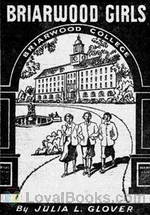 Briarwood Girls
Briarwood Girls
Kindred Spirits return for their Sophomore year at Briarwood College. There’s a new girl who upsets the status quo. (Introduction by Linda Velwest) | |
By: Jefferson Davis (1808-1889) | |
|---|---|
 Rise and Fall of the Confederate Government, Volume 1a
Rise and Fall of the Confederate Government, Volume 1a
The Rise and Fall of the Confederate Government (1881) is written by Jefferson Davis, former President of the Confederate States of America during the American Civil War. Davis wrote the book as a straightforward history of the Confederate States of America and as an apologia for the causes that he believed led to and justified the American Civil War. Davis spared little detail in describing every aspect of the Confederate constitution and government, in addition to which he retold in detail numerous military campaigns... | |
By: Hiram Bingham (1875-1956) | |
|---|---|
 Inca Lands
Inca Lands
Prof. Hiram Bingham of Yale Makes the Greatest Archaeological Discovery of the Age by Locating and Excavating Ruins of Machu Picchu on a Peak in the Andes of Peru.There is nothing new under the sun, they say. That is only relatively true. Just now, when we thought there was practically no portion of the earth's surface still unknown, when the discovery of a single lake or mountain, or the charting of a remote strip of coast line was enough to give a man fame as an explorer, one member of the daredevil explorers' craft has "struck it rich... | |
By: Florence A. Merriam (1863-1948) | |
|---|---|
 A-Birding on a Bronco
A-Birding on a Bronco
Florence Augusta Merriam Bailey (August 8, 1863 - September 22, 1948) was an American ornithologist and nature writer. She started observing bird behavior at a time when most bird study was based on collections and skins. By 1885, she began to write articles focusing on protecting birds. Her introduction of a birdwatching field guide, aimed at living birds, is considered the first in the tradition of modern bird guides. She wrote the first of these at the age of 26, initially as a series of notes in the Audubon Magazine and later as books. In "A-Birding on a Bronco," she writes an engaging memoir about her several trips to study birds on a ranch in California in the late 1800's. | |
By: Arthur J. Rees (1872-1942) | |
|---|---|
 The Shrieking Pit
The Shrieking Pit
The Shrieking Pit is one of Arthur Rees's earlier works, and is a good old fashioned murder mystery story. Grant Colwyn, a private detective, is holidaying in East Anglia when he notices a young man at a nearby table behaving peculiarly. The young man later leaves the hotel without paying his bill, and turns up in a nearby hamlet in the Norfolk marshes where he takes lodgings at the village inn. The next day, another guest at the inn is found dead, and the young man is missing. Can Colwyn sort out the mystery and prove the young man's innocence one way or the the other? | |
By: Mrs. Humphry Ward (1851-1920) | |
|---|---|
 Marcella
Marcella
Mary Augusta Ward was a very popular author at the end of the 19th century. The arrival of Marcella was discussed a lot in the London news papers. This popular novel tells about Marcella Boyce, a beauty of the 1880s, who thinks she truly believes in the values of socialism. A 21-year-old art student, she lives in a boarding house in Kensington until her father inherits Mellor Park, the family estate which is located in the Midlands. She unwillingly leaving her studies, all the things she loves and wants to do, and her friends, and starts her new life at Mellor Park, determined to help the poor people she sees around her... | |
By: Thomas Dixon, Jr. (1864-1946) | |
|---|---|
 Clansman, An Historical Romance of the Ku Klux Klan
Clansman, An Historical Romance of the Ku Klux Klan
The second book in a trilogy of the Reconstruction era - The Leopard's Spots (1902), The Clansman (1905), and The Traitor (1907), this novel was the basis for the 1915 silent movie classic, "The Birth Of A Nation". Within a fictional story, it records Dixon's understanding of the origins of the first Ku Klux Klan (his uncle was a Grand Titan during Dixon's childhood), recounting why white southerners' began staging vigilante responses to the savage personal insults, political injustices and social cruelties heaped upon them during Reconstruction... | |
By: Henry Drummond | |
|---|---|
 The Greatest Thing in the World and Other Addresses
The Greatest Thing in the World and Other Addresses
The spiritual classic The Greatest Thing In the World is a trenchant and tender analysis of Christian love as set forth in the thirteenth chapter of I Corinthians. The other addresses speak to other aspects of Christian life and thought. | |
By: Marguerite Stockman Dickson | |
|---|---|
 Vocational Guidance for Girls
Vocational Guidance for Girls
VOCATIONAL GUIDANCE FOR GIRLSBy MARGUERITE STOCKMAN DICKSONA FOREWORDFortunate are we to have from the pen of Mrs. Dickson a book on the vocational guidance of girls. Mrs. Dickson has the all-round life experiences which give her the kind of training needed for a broad and sympathetic approach to the delicate, intricate, and complex problems of woman's life in the swiftly changing social and industrial world. Mrs. Dickson was a teacher for seven years in the grades in the city of New York. She then became the partner of a superintendent of schools in the business of making a home... | |
By: Marietta Holley (1836-1926) | |
|---|---|
 Poems
Poems
This is a collection of poems by Marietta Holley, better known as Josiah Allen's Wife. | |
By: Clara M. Beede | |
|---|---|
 Clear Crystals
Clear Crystals
Book of 31 short poems dedicated to Soldierboys. | |
By: David Starr Jordan (1851-1931) | |
|---|---|
 Life's Enthusiasms
Life's Enthusiasms
The words in this essay on positive thought sing like those in Whitman's "Leaves of Grass." The author praises joyous living and recommends certain routes to its attainment. He explores schooling (public secondary and the university), travel, and the study of nature as ways to stay buoyant during life's trials. He also praises the power of the arts (literature, music, painting, sculpture) to keep spirits soaring. | |
By: Robert Copland (fl. 1515) | |
|---|---|
 Jyl of Breyntfords Testament
Jyl of Breyntfords Testament
Introduction - This is a collection of ten comic pieces from the 16th century and earlier, as compiled and edited by Frederick Furnivall for private circulation in 1871. Only the first is by Copland. (Introduction by Grant Hurlock) | |
By: US Office of Civil Defense | |
|---|---|
 In Time Of Emergency: A Citizen's Handbook On Nuclear Attack, Natural Disasters
In Time Of Emergency: A Citizen's Handbook On Nuclear Attack, Natural Disasters
A major emergency affecting a large number of people may occur anytime and anywhere. It may be a peacetime disaster such as a flood, tornado, fire, hurricane, blizzard or earthquake. It could be an enemy nuclear attack on the United States. In any type of general disaster, lives can be saved if people are prepared for the emergency, and know what actions to take when it occurs. This handbook, "In Time of Emergency" (1968), contains basic general information on both nuclear attack and major natural disasters... | |
By: Natalie Sumner Lincoln (1881-1935) | |
|---|---|
 The Red Seal
The Red Seal
Nothing is what it seems to be as events unfold in this entertaining mystery by Natalie Sumner Lincoln. Red seals and red herrings abound and will keep you guessing all the way through the final chapter! | |
By: Emmeline Pankhurst (1858-1928) | |
|---|---|
 My Own Story
My Own Story
Emmeline Pankhurst was a British political activist and leader of the British suffragette movement. She was widely criticized for her militant tactics, but her work is recognised as a crucial element in achieving women's suffrage in Britain. In her autobiography, written and published just as the Great War was breaking out, Pankhurst tells of her experiences in fighting for women's rights. | |
By: Alice Meynell (1847-1922) | |
|---|---|
 Fold
Fold
Alice Christiana Gertrude Meynell was an English writer, editor, critic, and suffragist, now remembered mainly as a poet. At the end of the 19th century, in conjunction with uprisings against the British (among them the Indians', the Zulus', the Boxer Rebellion, and the Muslim revolt led by Muhammad Ahmed in the Sudan), many European scholars, writers, and artists, began to question Europe's colonial imperialism. This led the Meynells and others in their circle to speak out for the oppressed. Alice Meynell was a vice-president of the Women Writers' Suffrage League, founded by Cicely Hamilton and active 1908–19. | |
By: William S. Gilbert (1836-1911) | |
|---|---|
 The Pirates of Penzance
The Pirates of Penzance
The Pirates of Penzance; or, The Slave of Duty is a comic opera in two acts, with music by Arthur Sullivan and libretto by W. S. Gilbert. The story concerns Frederic, who, having completed his 21st year, is released from his apprenticeship to a band of tender-hearted pirates. He meets Mabel, the daughter of Major-General Stanley, and the two young people fall instantly in love. Frederic finds out, however, that he was born on 29 February, and so, technically, he only has a birthday each leap year... | |
By: Charles Watts Whistler (1856-1913) | |
|---|---|
 Havelok the Dane: A Legend of Old Grimsby and Lincoln
Havelok the Dane: A Legend of Old Grimsby and Lincoln
Troy, Athens, Rome... each has its founding legend. So too does the Lincolnshire town of Grimsby, once the largest fishing port in the world. Havelok the Dane probably derives from a folk-tale, orally passed down before assuming written form - first in Anglo-Norman French, later in Middle English verse (c. 1280-1300). It tells of the rescue of the Danish prince from a wicked regent, who has tried to procure Havelok's murder. Grim the fisher, the appointed hit-man, thwarts the plan by spiriting the lad to England, where Grim settles with his family on the coast, adopting Havelok as his foster-son and naming the new community after himself... | |
By: Ridgwell Cullum | |
|---|---|
 The Trail of the Axe
The Trail of the Axe
Dave ran a lumber mill in western Canada. There are some workers within his organization who he trusts implicitly, some who he doesn’t trust at all, and some who he is unsure about. But Dave is basically a trusting soul. Most of the folks in Malkern liked him, as he had been a major factor in shaping the village and in providing employment for a lot of the folks who lived in the area. Dave was not a pleasant site to look at; ungainly, not very attractive, yet he had a heart that was the antithesis of his lack of physical attractiveness... | |
By: Eleanor Farjeon (1881-1965) | |
|---|---|
 Martin Pippin in the Apple Orchard
Martin Pippin in the Apple Orchard
The wandering minstrel Martin Pippin finds a lovelorn ploughman who begs him to visit the orchard where his beloved has been locked in the well-house with six sworn virgins to guard her. Martin Pippin goes to the rescue and wins the confidence of the young women by telling them love stories. Although ostensibly a children's book, the six love stories, which have much the form of Perrault's fairy tales such as Beauty and the Beast and Cinderella, have a depth which is adult in sentiment, and indeed they were written not for a child but for a young soldier, Victor Haslam... | |
By: Henry Gilbert (1868-1937) | |
|---|---|
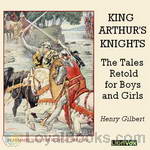 King Arthur's Knights: The Tales Retold for Boys & Girls
King Arthur's Knights: The Tales Retold for Boys & Girls
This book is an attempt to tell some of the stories of King Arthur and his Knights in a way which will be interesting to every boy and girl who loves adventures. (Introduction by Henry Gilbert) | |
By: Ralph Waldo Trine (1866-1958) | |
|---|---|
 In Tune with the Infinite
In Tune with the Infinite
Trine tells us that by connecting and harmonizing with the Universe we attract love, health, peace and success. Trines' writings may have been the most important to the "New Thought" movement of the late 1800's and early 1900's which was the forerunner to the "New Age" movement. | |
By: Henry A. Sherman (1870-?) | |
|---|---|
 Children's Bible
Children's Bible
This is a Book of Children's Bible Stories. | |
By: Robert Wood Williamson | |
|---|---|
 The Mafulu
The Mafulu
The Mafulu, Mountain People of British New GuineaBy Robert W. WilliamsonINTRODUCTION By Dr. A.C. Haddon It is a great pleasure to me to introduce Mr. Williamson's book to the notice of ethnologists and the general public, as I am convinced that it will be read with interest and profit. Perhaps I may be permitted in this place to make a few personal remarks. Mr. Williamson was formerly a solicitor, and always had a great longing to see something of savage life, but it was not till about four years ago that he saw his way to attempting the realisation of this desire by an expedition to Melanesia... | |
By: Izaak Walton (1593-1683) | |
|---|---|
 The Compleat Angler
The Compleat Angler
The Compleat Angler is a celebration of the art and spirit of fishing in prose and verse. Walton did not profess to be an expert with the fly, but in the use of the live worm, the grasshopper and the frog "Piscator" could speak as a master. There were originally only two interlocutors in the opening scene, "Piscator" and "Viator"; but in the second edition, as if in answer to an objection that "Piscator" had it too much in his own way in praise of angling, he introduced the falconer, "Auceps," changed "Viator" into "Venator" and made the new companions each dilate on the joys of his favourite sport. | |
By: Stanley Lane-Poole (1854-1931) | |
|---|---|
 Story of the Barbary Corsairs
Story of the Barbary Corsairs
A history of the pirating activities along and around the "Barbary coast" between the 15th and 19th centuries, from the time of the pirate, Ujra Barbarossa, to the French control of Algeria in 1830. Although piracy had plagued all the world's waterways from the first time man decided to trade by boat or ship, authors Lane-Poole and Kelley tell mainly of the origins and "Golden Age" of the Moor pirates who rampaged the Mediterranean Sea from ports of call along the north coast of Africa. | |
By: Hugh Walpole (1884-1941) | |
|---|---|
 Cathedral
Cathedral
Sir Hugh Seymour Walpole, CBE (1884 – 1941) was an English novelist. He was the son of an Anglican clergyman, intended for a career in the church but drawn instead to writing. Among those who encouraged him were the authors Henry James and Arnold Bennett. His skill at scene-setting, vivid plots, and high profile as a lecturer brought him a large readership in the United Kingdom and North America. He was a best-selling author in the 1920s and 1930s, but has been largely neglected since his death... | |
 Jeremy
Jeremy
With affectionate humor, Mr. Walpole tells the story of Jeremy and his two sisters, Helen and Mary Cole, who grow up in Polchester, a quiet English Cathedral town. There is the Jampot, who is the nurse ; Hamlet, the stray dog ; Uncle Samuel, who paints pictures and is altogether 'queer’; of course, Mr. and Mrs. Cole, and Aunt Amy. Mr. Walpole has given his narrative a rare double appeal, for it not only recreates for the adult the illusion of his own happiest youth, but it unfolds for the child-reader a genuine and moving experience with real people and pleasant things... | |
 Golden Scarecrow
Golden Scarecrow
Toying with the distinctions between reader and narrator, author and character, imagination and perception, Sir Hugh Seymour Walpole's The Golden Scarecrow, in nine chapters, presents nine stories of nine children, united by location, more or less. A tenth story of a tenth life, divided into Prologue and Epilogue, provides a different sort of unity. These gentle and horrible tales of the weird may seem suitable for young readers, then again, they may not. | |
By: James Cardinal Gibbons (1834-1921) | |
|---|---|
 The Faith of Our Fathers
The Faith of Our Fathers
The Faith of Our Fathers: A Plain Exposition and Vindication of the Church Founded by Our Lord Jesus Christ is a book published in 1876 by archbishop James Gibbons, which became a best-selling conversion manual in the United States, and by 1980 was in its 111th printing.(From the preface) “The object of this little volume is to present in a plain and practical form an exposition and vindication of the principal tenets of the Catholic Church. It was thought sufficient to devote but a brief space to such Catholic doctrines and practices as are happily admitted by Protestants, while those that are controverted by them are more elaborately elucidated... | |
By: Jacob Joshua Levison (1881-?) | |
|---|---|
 Studies About Trees
Studies About Trees
In this work Levison aims to create a book that allows beginners to be able to understand how to identify trees, as well as to give information of their structure and uses. Once these topics are addressed, he then moves into concepts of care, planting and forestry. | |
By: Mikhail Yurevich Lermontov (1814-1841) | |
|---|---|
 Hero of Our Time
Hero of Our Time
A Hero of Our Time is indeed a portrait, but not of one man. It is a portrait built up of all our generation's vices in full bloom. You will again tell me that a human being cannot be so wicked, and I will reply that if you can believe in the existence of all the villains of tragedy and romance, why wouldn't believe that there was a Pechorin? If you could admire far more terrifying and repulsive types, why aren't you more merciful to this character, even if it is fictitious? Isn't it because there's more truth in it than you might wish? | |
By: Francis Rolt-Wheeler | |
|---|---|
 The Boy With the U.S. Census
The Boy With the U.S. Census
THE BOY WITH THE U.S. CENSUSBY FRANCIS ROLT-WHEELERPREFACELife in America to-day is adventurous and thrilling to the core. Border warfare of the most primitive type still is waged in mountain fastnesses, the darkest pages in the annals of crime now are being written, piracy has but changed its scene of operations from the sea to the land, smugglers ply a busy trade, and from their factory prisons a hundred thousand children cry aloud for rescue. The flame of Crusade sweeps over the land and the call for volunteers is abroad... | |
By: Francis Beaumont (1584-1616) | |
|---|---|
 The Maid's Tragedy
The Maid's Tragedy
Beaumont and Fletcher's The Maid's Tragedy (first published 1619) is a sensational Jacobean sex tragedy. When gentleman soldier Melantius returns to Rhodes, he finds his dear friend Amintor is recently married - but not to his troth-plight love Aspatia (the maid of the title). Instead, the King has arranged a match between Amintor and Melantius' sister, the beautiful Evadne. On his wedding night, Amintor finds that his new wife has married him under false pretenses - and this unleashes a torrent of dire consequences, sexual, emotional, and ultimately political. | |
By: Charles W. Diffin (1884-1966) | |
|---|---|
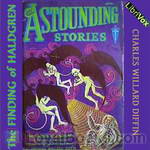 The Finding of Haldgren
The Finding of Haldgren
Chet Ballard answers the pinpoint of light that from the craggy desolation of the moon stabs out man's old call for help. | |
By: Charles Willard Diffin (1884-1966) | |
|---|---|
 Brood of the Dark Moon
Brood of the Dark Moon
Once more Chet, Walt and Diane are united in a wild ride to the Dark Moon—but this time they go as prisoners of their deadly enemy Schwartzmann. | |
By: Claude H. Miller | |
|---|---|
 Outdoor Sports and Games
Outdoor Sports and Games
The Library of Work and Play, OUTDOOR SPORTS AND GAMESBy CLAUDE H. MILLER, PH.B.INTRODUCTORY The human body a perfect machine--How to keep well--Outdoor sleeping--Exercise and play--Smoking--Walking Suppose you should wake up Christmas morning and find yourself to be the owner of a bicycle. It is a brand-new wheel and everything is in perfect working order. The bearings are well oiled, the nickel is bright and shiny and it is all tuned up and ready for use. If you are a careful, sensible boy you can have fun with it for a long time until finally, like the One Hoss Shay in the poem, it wears out and goes to pieces all at once... | |
By: Wilbur Fisk Gordy | |
|---|---|
 Stories of Later American History
Stories of Later American History
STORIES OF LATER AMERICAN HISTORYBy WILBUR F. GORDYPREFACEThis book, like Stories of Early American History, follows somewhat closely the course of study prepared by the Committee of Eight, the present volume covering the topics outlined for Grade V, while the earlier one includes the material suggested for Grade IV. It was the plan of that committee to take up in these grades, largely in a biographical way, a great part of the essential facts of American history; and with this plan the author, who was a member of that committee, was in hearty accord... | |
By: Sir Francis Galton (1822-1911) | |
|---|---|
 The Art of Travel
The Art of Travel
The Art of Travel is a handbook of practical advice for the adventure seeking Victorian. We hear how to organize all steps of a voyage, from the very beginnings (qualifications of a traveller, how to organize an expedition, the perfect outfit), to the actual trip (how to choose a bivouac, huts and tents, what game to shoot - and how, dealing with (hostile) savages), until the final, hopefully successful, return of the traveller (arranging memoranda). | |
By: Marie D. Webster (1859-1956) | |
|---|---|
 Quilts, Their Story and How to Make Them
Quilts, Their Story and How to Make Them
Although the quilt is one of the most familiar and necessary articles in our households, its story is yet to be told. In spite of its universal use and intimate connection with our lives, its past is a mystery which -- at the most -- can only be partially unravelled. (from the Introduction) | |
By: Maria W. Stewart (1803-1879) | |
|---|---|
 Meditations from the Pen
Meditations from the Pen
Maria W. Stewart was America's first black woman political writer. Between 1831 and 1833, she gave four speeches on the topics of slavery and women's rights. Meditations From The Pen of Mrs. Maria W. Stewart—published in 1879 shortly before her death—is a collection of those speeches as well as her memoir, some meditations and prayers. They are political, poetical and sermon all at the same time; but in the mileu in which she lectured, they were a critically important part of the abolitionist movement years before the contributions of others such as Frederick Douglass and Sojourner Truth... | |
By: Margaret Fuller (1810-1850) | |
|---|---|
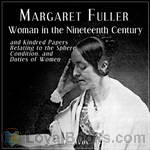 Woman in the Nineteenth Century and Kindred Papers Relating to the Sphere, Condition, and Duties of Women
Woman in the Nineteenth Century and Kindred Papers Relating to the Sphere, Condition, and Duties of Women
Margaret Fuller (1810-1850) was an American feminist, writer, and intellectual associated with the Transcendentalist movement. Her book Woman in the Nineteenth Century (1845) is considered the first major feminist work in the United States. Her life was short but full. She became the first editor of the transcendentalist journal The Dial in 1840, before joining the staff of the New York Tribune under Horace Greeley in 1844. By the time she was in her 30s, Fuller had earned a reputation as the best-read person in New England, male or female, and became the first woman allowed to use the library at Harvard College... | |
By: John Augustine Zahm (1851-1921) | |
|---|---|
 Woman in Science
Woman in Science
A history of woman's role in science through the ages and the many contributions she has made.Chapter Titles are:1. Woman's Long Struggle for Things of the Mind2. Woman's Capacity for Scientific Pursuits3. Women in Mathematics4. Women in Astronomy5. Women in Physics6. Women in Chemistry7. Women in the Natural Sciences8. Women in Medicine and Surgery9. Women in Archæology10. Women as Inventors11. Women as Inspirers and Collaborators in Science12. The Future of Women in Science: Summary and Epilogue | |
By: Charles Hemstreet (1866-?) | |
|---|---|
 The Story of Manhattan
The Story of Manhattan
The history of New York City is told as a story, in few words. It begins with Henry Hudson's discovery of Manhattan in 1609. And it finishes in 1898 when the island of Manhattan becomes the Borough of Manhattan of Greater New York. | |
By: Rebecca Sophia Clarke (1833-1906) | |
|---|---|
 Little Prudy
Little Prudy
I am going to tell you something about a little girl who was always saying and doing funny things, and very often getting into trouble. Her name was Prudy Parlin, and she and her sister Susy, three years older, lived in Portland, in the State of Maine, though every summer they went to Willowbrook, to visit their grandmother. (From chapter 1 ) | |
By: Hallie Erminie Rives (1874-1956) | |
|---|---|
 Tales From Dickens
Tales From Dickens
The Old Curiosity Shop; Hard Times; A Tale of Two Cities; Oliver Twist; The Pickwick Papers. Have you read any or all of these famous Dickens stories? The author of this marvelous book, Rives Ermine, a highly successful author in her own right, simply wanted to retell the basic elements of some of Dickens best beloved novels and story lines. Now is your chance to revisit these stories and revive the memories of great reads. Of it you haven't gotten around to some of these classics, this would be a marvelous chance to listen to what they are about so you can enjoy them even more in the original later... | |
By: Mary Stoyell Stimpson | |
|---|---|
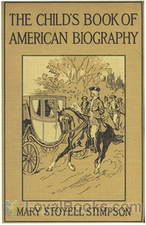 The Child's Book of American Biography
The Child's Book of American Biography
In every country there have been certain men and women whose busy lives have made the world better or wiser. The names of such are heard so often that every child should know a few facts about them. It is hoped the very short stories told here may make boys and girls eager to learn more about these famous people. (from the Forward of the text) | |
By: Frank L. Packard (1877-1942) | |
|---|---|
 Further Adventures of Jimmie Dale
Further Adventures of Jimmie Dale
In the previous book of adventures, we met Jimmie Dale, a wealthy playboy by day, who at night put on a disguise and became The Gray Seal, a daredevil entering businesses or homes and cracking safes, always leaving a diamond shaped, gray paper "seal" behind to mark his conquest. He never took anything, but just wanted the thrill of it. This had spun out of control when a mysterious woman, whom Jimmie Dale nicknames The Tocsin, caught him at it and blackmailed him into doing her bidding. On her instigation, he got involved in numerous underworld crimes, righting wrongs and protecting innocent bystanders... | |
By: George Crabbe (1754-1832) | |
|---|---|
 Borough
Borough
English village life and villagers in the east of England in the late 1700’s and early 1800s—is the subject of The Borough. George Crabbe was an English poet, surgeon, and clergyman. He is best known for his early use of the realistic narrative form and his descriptions of middle and working-class life and people. Lord Byron, an avowed admirer of Crabbe's poetry, described him as "nature's sternest painter, yet the best." Crabbe's poetry was predominantly in the form of heroic couplets, and has been described as unsentimental in its depiction of provincial life and society... | |
By: Grace Isabel Colbron | |
|---|---|
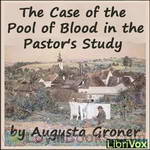 The Case of the Pool of Blood in the Pastor’s Study
The Case of the Pool of Blood in the Pastor’s Study
Joseph Muller, police detective, travels to a remote Hungarian village to discover the truth behind the murder of a beloved village Pastor. (Introduction by Dawn) | |
By: Augusta Groner (1850-1929) | |
|---|---|
 Case Of The Registered Letter
Case Of The Registered Letter
A man is found shot dead and the man to whom all evidence points insists he is innocent. | |
By: Arnold Kennedy (1853-1938) | |
|---|---|
 Merry Clappum Junction
Merry Clappum Junction
This is a jolly little book about a little boy, a dog, a train and a house. But not an ordinary train, oh no, and not an ordinary house either! And there are songs, too. The Preface is short, dull and only for the grown-ups. | |
By: H. De Vere Stacpoole (1863-1951) | |
|---|---|
 Beach of Dreams
Beach of Dreams
Two sailors, Harbutt and Raft, discuss their plight as workers under the thumb of a wealthy owner. During a windstorm, Raft and his fellow hands must climb a mast of the three-master to control a rigging gone astray. Once they master that runaway rigging, they pause to watch another vessel in the distance. It's a ship many have seen before. We are introduced to the occupants of this new ship, the Gaston de Paris. The owner is Prince Selm, who loves the finest things in life, yet is drawn to the sea... | |